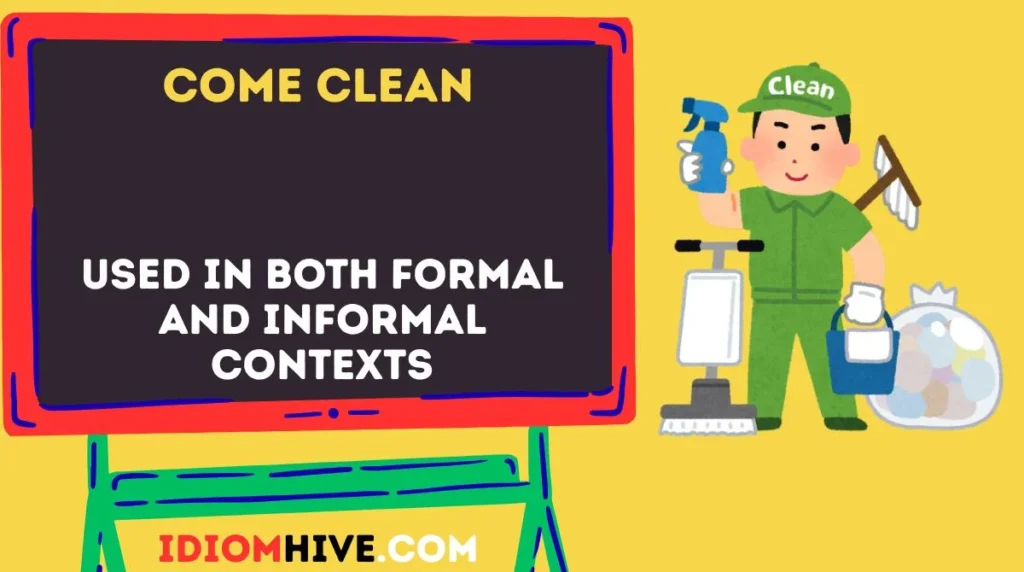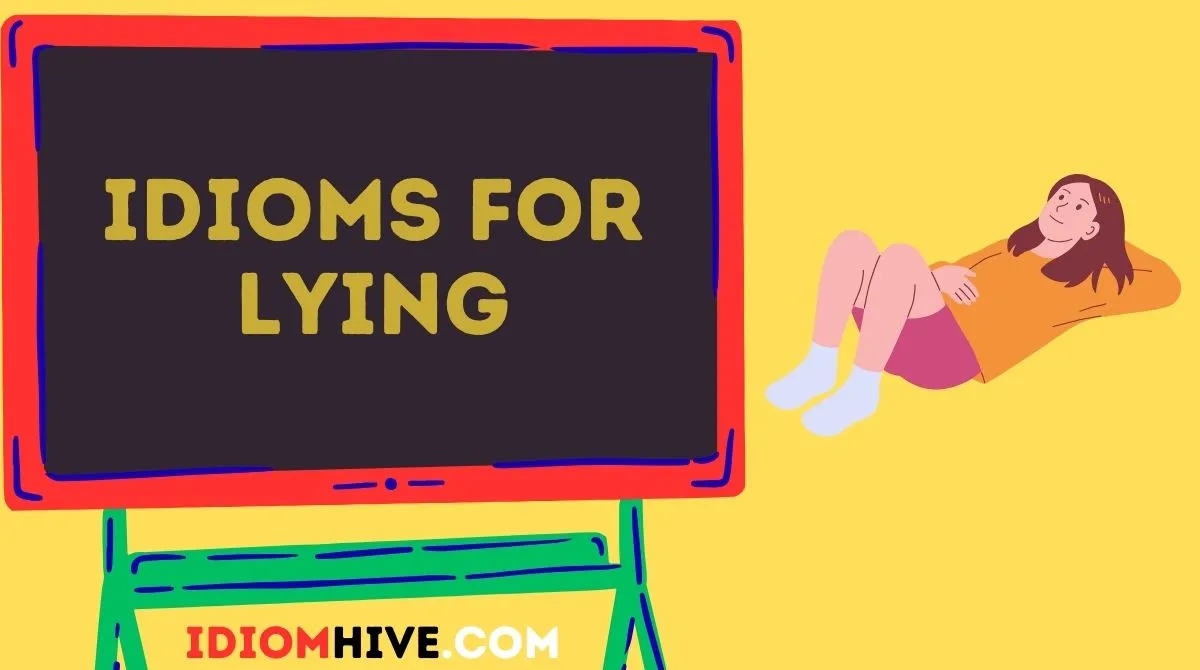Language is full of color, creativity, and hidden meanings. One of the best ways this comes to life is through idioms. Idioms are expressions whose meanings are not understood just by looking at the individual words, but instead,
they carry figurative or cultural significance. For example, if someone says, “spill the beans,” they don’t mean literally dropping beans on the floor — they mean to reveal a secret.
When it comes to lying, English has a huge collection of idioms. This is because lying and dishonesty are common parts of human behavior, and language has developed many clever ways to describe it.
Learning idioms for lying is useful because they help you understand conversations better, add humor or sharpness to your speech, and express ideas in more colorful ways.
Whether you’re writing a story, giving a speech, or just chatting with friends, knowing these idioms will help you sound more natural and fluent in English.
Did You Know?
Many idioms about lying come from old stories, literature, and even professions. For example, the phrase “poker face” comes from the card game poker, where players must hide their true emotions. Others, like “caught red-handed,” come from historical punishments for criminals. Idioms preserve cultural history while making our speech lively!
Idioms for Direct Lying

Pull the Wool Over Someone’s Eyes
Meaning: To trick or deceive someone.
Example: The salesman tried to pull the wool over my eyes with false promises.
Similar Idiom: Lead someone up the garden path.
Note: Common in everyday conversations when someone is being tricked.
Bend the Truth
Meaning: To slightly change the truth without completely lying.
Example: He bent the truth about his work experience in the interview.
Similar Idiom: Stretch the truth.
Note: Often used in both professional and casual settings.
Economy with the Truth
Meaning: Not giving the full truth, hiding some facts.
Example: The politician was accused of being economical with the truth.
Similar Idiom: Half-truth.
Note: More formal, often used in media and politics.
White Lie
Meaning: A harmless or small lie, usually told to avoid hurting someone’s feelings.
Example: I told a white lie when I said I liked her cooking.
Similar Idiom: Sugarcoat the truth.
Note: Common in daily life, informal.
Tall Tale
Meaning: An exaggerated or unbelievable story.
Example: He told us a tall tale about fighting a bear.
Similar Idiom: Fish story.
Note: Often humorous, used in casual storytelling.
Fib
Meaning: A small or childish lie.
Example: Kids sometimes fib about finishing their homework.
Similar Idiom: White lie.
Note: Informal, often used with children.
Barefaced Lie
Meaning: A bold, obvious lie.
Example: She told a barefaced lie when she denied being there.
Similar Idiom: Bold-faced lie.
Note: Strong expression, often used to show disapproval.
Pack of Lies
Meaning: A set of complete lies.
Example: His story turned out to be a pack of lies.
Similar Idiom: Web of lies.
Note: Common in formal and informal usage.
Liar, Liar, Pants on Fire
Meaning: A childish taunt for someone caught lying.
Example: The kids shouted, “Liar, liar, pants on fire!” at their friend.
Similar Idiom: You can’t fool me.
Note: Mostly used by children, playful.
Fiddle the Books
Meaning: To cheat or lie in financial accounts.
Example: The accountant was arrested for fiddling the books.
Similar Idiom: Cook the books.
Note: Used in professional and business contexts.
Idioms About Hiding the Truth
Cover Up
Meaning: To hide the truth, often about a mistake or crime.
Example: The government tried to cover up the scandal.
Similar Idiom: Sweep under the rug.
Note: Common in media and politics.
Keep a Poker Face
Meaning: To hide emotions and not show the truth.
Example: She kept a poker face during the tough negotiation.
Similar Idiom: Stone-faced.
Note: Used in business or games like poker.
Skeletons in the Closet
Meaning: Hidden secrets from the past.
Example: Every family has some skeletons in the closet.
Similar Idiom: Dirty laundry.
Note: Used informally to discuss hidden scandals.
Bury the Truth
Meaning: To hide the reality deliberately.
Example: They tried to bury the truth about the failed project.
Similar Idiom: Sweep it under the carpet.
Note: Often used in politics or business.
Double-Dealing
Meaning: Being dishonest while pretending to be honest.
Example: He was fired for double-dealing with clients.
Similar Idiom: Two-faced.
Note: Formal and professional usage.
Smoke and Mirrors
Meaning: Something intended to hide the truth and confuse people.
Example: The company’s promises were just smoke and mirrors.
Similar Idiom: Illusion.
Note: Common in politics and business.
Under False Pretenses
Meaning: Lying about one’s situation to gain something.
Example: He entered the country under false pretenses.
Similar Idiom: Fake it.
Note: Legal and formal contexts.
Stretch the Truth
Meaning: To exaggerate the truth.
Example: He stretched the truth about his achievements.
Similar Idiom: Embellish.
Note: Common in storytelling and casual talk.
Idioms for Being Caught in a Lie
Caught Red-Handed
Meaning: Caught while doing something wrong.
Example: The thief was caught red-handed stealing jewelry.
Similar Idiom: In the act.
Note: Common in crime and wrongdoing.
The Jig Is Up
Meaning: The lie or trick is discovered.
Example: When they found the evidence, he knew the jig was up.
Similar Idiom: Game over.
Note: Informal, often dramatic.
Come Clean

Meaning: To finally tell the truth after lying.
Example: He came clean about cheating on the test.
Similar Idiom: Confess.
Note: Used in both formal and informal contexts.
Spill the Beans
Meaning: To reveal a secret.
Example: She spilled the beans about the surprise party.
Similar Idiom: Let the cat out of the bag.
Note: Informal and casual.
Let the Cat Out of the Bag
Meaning: Accidentally reveal a secret.
Example: He let the cat out of the bag about the promotion.
Similar Idiom: Spill the beans.
Note: Common in daily conversation.
Call Someone’s Bluff
Meaning: To challenge someone to prove their lie.
Example: I called his bluff when he said he could swim across the lake.
Similar Idiom: Put to the test.
Note: Often used in games or challenges.
Unmask the Truth
Meaning: To reveal a hidden lie.
Example: The journalist unmasked the truth behind the deal.
Similar Idiom: Expose the truth.
Note: Often formal, in media or investigations.
Give the Game Away
Meaning: Accidentally reveal the secret or trick.
Example: His nervous smile gave the game away.
Similar Idiom: Tip off.
Note: Used informally.
Idioms About Dishonest People
Two-Faced
Meaning: Someone who acts friendly but is secretly dishonest.
Example: She’s two-faced — nice in front of you but rude behind your back.
Similar Idiom: Backstabber.
Note: Common in personal relationships.
Forked Tongue
Meaning: Someone who speaks lies or can’t be trusted.
Example: Don’t trust him — he speaks with a forked tongue.
Similar Idiom: Double-tongued.
Note: Old-fashioned but powerful.
Snake in the Grass
Meaning: A hidden enemy or deceiver.
Example: Watch out for him, he’s a snake in the grass.
Similar Idiom: Backstabber.
Note: Informal, strong insult.
Wolf in Sheep’s Clothing
Meaning: Someone who pretends to be good but is dangerous.
Example: The conman was a wolf in sheep’s clothing.
Similar Idiom: Hidden danger.
Note: Common in literature, formal or informal.
Talking Out of Both Sides of the Mouth
Meaning: Saying two opposite things to different people.
Example: The manager talked out of both sides of his mouth about the project.
Similar Idiom: Double-dealing.
Note: Often used in politics.
Full of Hot Air
Meaning: Someone who talks a lot but without honesty or truth.
Example: Don’t believe him, he’s full of hot air.
Similar Idiom: All talk, no action.
Note: Informal, casual usage.
Cheat Someone Blind
Meaning: To completely deceive or rob someone.
Example: The scammer cheated him blind.
Similar Idiom: Rip off.
Note: Informal, everyday expression.
How to Use These Idioms in Daily Life
Idioms for lying can make your English sound natural and expressive. In speaking, use them in conversations to describe dishonesty or exaggeration, like “He was caught red-handed.” In writing, idioms add color and character to stories, essays, or articles, e.g., “The character was a wolf in sheep’s clothing.” In professional life, choose formal idioms like “economical with the truth” or “cover up” to discuss dishonesty without sounding too casual.
Common Mistakes Learners Make With Idioms
- Wrong Context:
❌ He told a barefaced lie about the surprise party.
✅ Better: He told a white lie about the surprise party. - Literal Understanding:
❌ He spilled the beans on the floor.
✅ Correct: He spilled the beans about the secret. - Mixing Idioms:
❌ She bent the cat out of the bag.
✅ Correct: She let the cat out of the bag.
FAQs
1. What is the difference between a white lie and a barefaced lie?
A white lie is small and harmless, while a barefaced lie is bold and obvious.
2. Are idioms for lying formal or informal?
Some are informal (liar, liar, pants on fire), while others are formal (economical with the truth). It depends on the situation.
3. Can idioms be used in professional writing?
Yes, but choose carefully. Use more formal ones like cover up or caught red-handed.
4. Do all cultures have idioms for lying?
Yes, but expressions differ. English idioms often come from history, literature, or games.
5. How can I practice idioms for lying?
Use them in sentences, role-play conversations, or notice them in movies and books.
Conclusion
Lying is a universal theme, and the English language reflects it through dozens of creative idioms. From white lies to barefaced lies, from poker faces to skeletons in the closet, these expressions give depth and richness to everyday conversations.
By learning and practicing them, you’ll not only improve your English fluency but also understand cultural references better. Next time you want to talk about dishonesty, skip plain words — choose an idiom that paints the picture!










